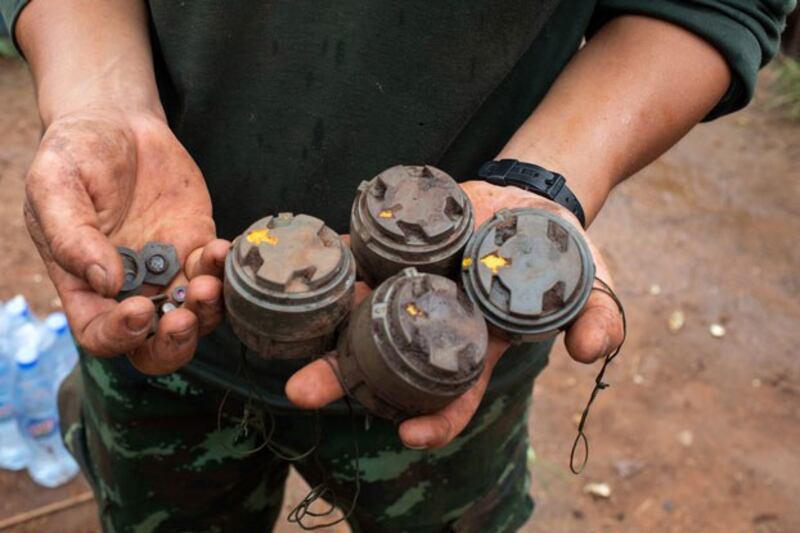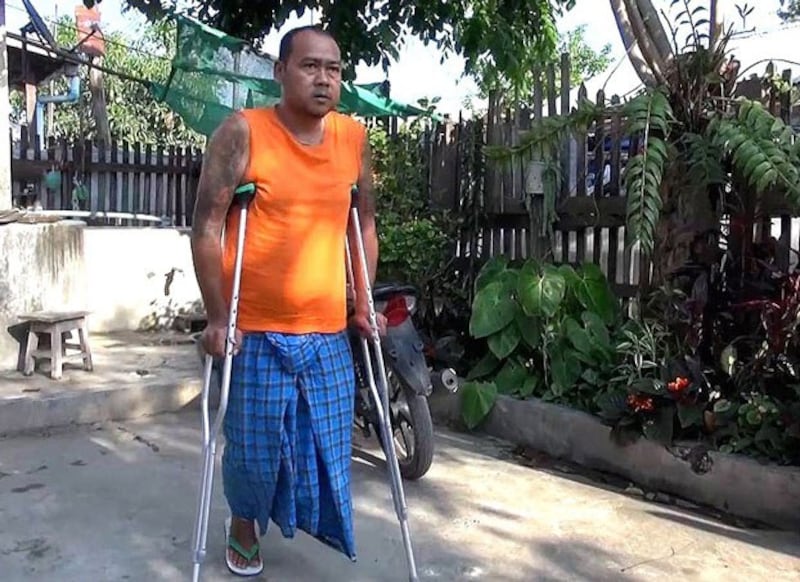People in more than half of Myanmar’s townships are at risk getting injured or dying from landmines, which are used by both the military and ethnic rebel forces, a landmine monitoring group said.
Nearly 170 of 330 townships are at risk of landmines — a figure that has increased by 68 townships since 2020, according to the International Campaign to Ban Landmines, whose monitoring wing tracks progress in eliminating landmines, cluster munitions and other explosive remnants of war.
The group issued the Burmese version of its latest 34-page Landmine & Cluster Munition Monitor report on Dec. 28. It did not include the total number of landmine incidents or victims for 2023, but recounted individual incidents covered in media reports.
In 2022, there were 384 deaths and 124 injuries caused by landmines in Myanmar, according to the monitoring group.
Myanmar is not a member of the Ottawa Convention, also referred to as the Mine Ban Treaty, which prohibits the use, stockpiling, production and transfer of anti-personnel landmines. Neither is the United States, China, Russia, India or Pakistan.
Both the ruling junta's armed forces and non-state armed groups have produced and used antipersonnel mines, including improvised blast and fragmentation mines that are victim-activated, said the report's 28-page English-language version.
“Myanmar’s Armed Forces have repeatedly used antipersonnel mines since seizing power in a coup in February 2021,” the report said. “This use represents a significant increase in use in previous years, including use around infrastructure such as mobile phone towers, extractive enterprises, and energy pipelines.”

From 2018 to 2021, the Myanmar military was the only armed forces in the world to use anti-personnel landmines, though Russia joined the list in 2022, said Yeshua Moser-Puangsuwan, a researcher for the Landmine and Cluster Munition Monitor, said at a press conference in Chiang Mai, Thailand, on Dec. 28.
“Myanmar is the only country in the world that uses deadly landmines from its military,” he said.
Among the mines seized by resistance armed groups were various types produced by the state-owned weapons production facility known as KaPaSa, or Defense Products Industries of Myanmar, the report said.
Some individual cases
The report cited numerous instances where landmine explosions killed or maimed civilian adults and children in 2023.
At the beginning of March, a man was seriously injured after stepping on a landmine in the May mountains, where a Myanmar Army contingent is stationed near Cedipyin village in Rathedaung township of Rakhine state.
On Dec. 26, Lwang Kham, 12, was injured when a landmine exploded near Ma Ding village in Waingmaw township in northern Myanmar’s Kachin state, near where the junta’s 58th Light Infantry Battalion is stationed, a resident who did not want to be named for security reasons, told RFA.
“In the afternoon, while he was looking after the cattle, the cattle stepped on a landmine and [the explosion] hit him near Ka War Hka creek,” the villager said, adding that many pieces of shrapnel hit his legs and his left eye.
The injured boy was taken to Myitkyina Hospital for surgery and medical treatment, he said.
In western Myanmar’s Chin state, residents are afraid to go to their hillside farms for fear of setting off an explosion, said Salai Vang Sweesan, assistant director of the Institute of Chin Affairs.
“In Chin, every village depends on the hillside farms to make a living. Since landmines are being planted along the roads [to the hillside farms], even if people want to go to the farms, it’s risky.”
Shan state
Northern Shan state, where fighting between junta troops and an alliance of ethnic armies is intense, has seen an increase in civilian casualties from landmines.
At least five civilians were injured and lost their limbs due to mine explosions in the towns of Kutkai, Lashio and Kyaukme towns amid fighting in December 2023 between junta forces and the Ta’ang National Liberation Army, or TNLA, local residents said.

On Dec. 6, a man from Nam Kyan village in Lashio township lost one of his legs and his other limbs were damaged when he stepped on a mine while looking for honey in the forest, residents said.
Two days later, a 63-year-old man from Nam Hu Twang village in Kyaukme township lost one of his legs when he stepped on a mine while cutting bamboo, according to people living in the community.
Residents used to gather firewood in the forest or work in cornfields before the fighting escalated, but now they have stopped and it has affected their abilities to provide for themselves, she said. Now they often hear blasts when dogs and cattle step on the mines.
“Villagers know that the mines are there,” she said. “That’s why we don’t go to the forest at all.”
RFA could not reach junta spokesman Maj. Gen. Zaw Min Tun for comment on the landmines.
Last August, the Cluster Munition Coalition condemned the new use of cluster munitions by the junta’s armed forces and demanded an immediate end to the use of this prohibited weapon.
At the time, a report by the organization’s monitoring wing indicated that junta forces had used what appeared to be domestically produced cluster bombs in attacks in several parts of the country since 2021.
“Myanmar’s production and use of cluster bombs is gravely concerning as these indiscriminate weapons primarily kill and injure civilians, Moser-Puangsuwan said in a statement. “There can be no justification for using them. All governments should condemn this use of an internationally-banned weapon.”
Translated by Htin Aung Kyaw for RFA Burmese. Edited by Roseanne Gerin and Malcolm Foster.

